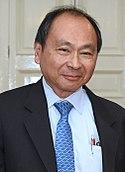Francis Fukuyama Quote
The proponents of identity politics on the left would argue that assertions of identity on the right are illegitimate and cannot be placed on the same moral plane as those of minorities, women, and other marginalized groups. Rather, they reflect the perspectives of a dominant mainstream culture that has been historically privileged and continues to be so. These arguments have obvious truth. Perceptions on the part of conservatives of advantages being unfairly given to minorities, women, or refugees are greatly exaggerated, as is the sense that political correctness has run amok everywhere. Social media contributes heavily to this problem, since a single comment or incident can ricochet around the internet and become emblematic of an entire category of people. The reality for many marginalized groups continues as before: African-Americans continue to be objects of police violence, and women continue to be assaulted and harassed.
The proponents of identity politics on the left would argue that assertions of identity on the right are illegitimate and cannot be placed on the same moral plane as those of minorities, women, and other marginalized groups. Rather, they reflect the perspectives of a dominant mainstream culture that has been historically privileged and continues to be so. These arguments have obvious truth. Perceptions on the part of conservatives of advantages being unfairly given to minorities, women, or refugees are greatly exaggerated, as is the sense that political correctness has run amok everywhere. Social media contributes heavily to this problem, since a single comment or incident can ricochet around the internet and become emblematic of an entire category of people. The reality for many marginalized groups continues as before: African-Americans continue to be objects of police violence, and women continue to be assaulted and harassed.
Related Quotes
About Francis Fukuyama
Fukuyama is best known for his book The End of History and the Last Man (1992), which argues that the worldwide spread of liberal democracies and free-market capitalism of the West and its lifestyle may signal the end point of humanity's sociocultural evolution and political struggle and become the final form of human government, an assessment met with numerous and substantial criticisms. In his subsequent book Trust: Social Virtues and Creation of Prosperity (1995), he modified his earlier position to acknowledge that culture cannot be cleanly separated from economics. Fukuyama is also associated with the rise of the neoconservative movement, from which he has since distanced himself.
Fukuyama has been a senior fellow at the Freeman Spogli Institute for International Studies since July 2010 and the Mosbacher Director of the Center on Democracy, Development and the Rule of Law at Stanford University. In August 2019, he was named director of the Ford Dorsey Master's in International Policy at Stanford.
Before that, he served as a professor and director of the International Development program at the School of Advanced International Studies of Johns Hopkins University. Previously, he was Omer L. and Nancy Hirst Professor of Public Policy at the School of Public Policy at George Mason University.
He is a council member of the International Forum for Democratic Studies founded by the National Endowment for Democracy and was a member of the Political Science Department of the RAND Corporation. He is also one of the 25 leading figures on the Information and Democracy Commission launched by Reporters Without Borders. In 2024 he received the Riggs Award for Lifetime Achievement in International and Comparative Public Administration.
